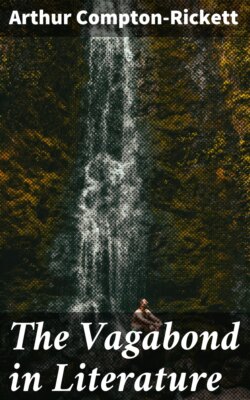Читать книгу The Vagabond in Literature - Arthur Compton-Rickett - Страница 8
На сайте Литреса книга снята с продажи.
IV
ОглавлениеTable of Contents
There is a certain type of Vagabondage which may be covered by the term “Bohemianism.” But ’tis of a superficial character mostly, and is in the nature of a town-made imitation. Graces and picturesqueness it may have of a kind, but it lacks the rough virility, the sturdy grit, which is the most attractive quality of the best Vagabond.
Bohemianism indeed is largely an attitude of dress; Vagabondage an attitude of spirit. At heart the Bohemian is not really unconventional; he is not nomadic by instinct as is the Vagabond.
Take the case of Charles Lamb. There was a man whose habits of life were pleasantly Bohemian, and whose sympathy with the Vagabond temperament has made some critics over-hastily class him temperamentally with writers like Hazlitt and De Quincey. He was not a true Vagabond at all. He was a Bohemian of the finer order, and his graces of character need no encomium to-day. But he was certainly not a Vagabond. At heart he was devoted to convention. When released from his drudgery of clerkship he confessed frankly how potent an influence routine had been and still was in his life. This is not the tone of the Vagabond. Even Elia’s wanderings on paper are more apparent than real, and there is a method in his quaintest fantasies. His discursive essays are arabesques observing geometrical patterns, and though seemingly careless, follow out cunningly preconceived designs. He only appears to digress; but all his bypaths lead back into the high road. Hazlitt, on the other hand, was a genuine digressionalist; so was De Quincey; so was Borrow. There is all the difference between their literary mosaic and the arabesques of Lamb. And should one still doubt how to classify Elia, one could scarcely place him among the “Children of the Open Air.” Make what allowance you like for his whimsical remarks about the country, it is certain that no passion for the Earth possessed him.
One characteristic, however, both the Bohemian and the Vagabond have in common—that is, restlessness. And although there is a restlessness which is the outcome of superabundant nervous energy—the restlessness of Dickens in his earlier years, for instance—yet it must be regarded as, for the most part, a pathological sign. One of the legacies of the Industrial Revolution has been the neurotic strain which it has bequeathed to our countrymen. The stress of life upon the nervous system in this era of commercialism has produced a spirit of feverish unrest which, permeating society generally, has visited a few souls with special intensity. It has never been summed up better than by Ruskin, when, in one of his scornful flashes, he declared that our two objects in life were: whatever we have, to get more; and wherever we are, to go somewhere else. Nervous instability is very marked in the case of Hazlitt and De Quincey; and there was a strain of morbidity in Borrow, Jefferies, and Stevenson.
Far more pronounced in its neurotic character is Modern Bohemianism—as I prefer to call the “town Vagabond.” The decadent movement in literature has produced many interesting artistic figures, but they lack the grit and the sanity of outlook which undoubtedly marks the Vagabond. In France to-day morbidity and Vagabondage are inseparable.
Gallic Vagabonds, such as Verlaine and Baudelaire, interesting as they are to men of letters and students of psychology, do not engage our affections as do the English Vagabonds. We do not take kindly to their personalities. It is like passing through the hot streets after inhaling the scent of the woodland. There is something stifling and unhealthy about the atmosphere, and one turns with relief to the vagabondage of men like Whitman, who are “enamoured of growth out of doors.”
Of profounder interest is the Russian Vagabond. In Russian Literature the Vagabond seems to be the rule, not the exception.
Every great Russian writer has more or less of the Vagabond about him. Tolstoy, it is true, wears the robe of the Moralist, and Tolstoy the Ascetic cries down Tolstoy the Artist. But I always feel that the most enduring part of Tolstoy’s work is the work of the Vagabond temperament that lurks beneath the stern preacher. Political and social exigencies have driven him to take up a position which is certainly not in harmony with many traits in his nature.
In the case of Gorky, of course, we have the Vagabond naked and unashamed. His novels are fervent defences of the Vagabond. What could be franker than this?—“I was born outside society, and for that reason I cannot take in a strong dose of its culture, without soon feeling forced to get outside it again, to wipe away the infinite complications, the sickly refinements, of that kind of existence. I like either to go about in the meanest streets of towns, because, though everything there is dirty, it is all simple and sincere; or else to wander about in the high roads and across the fields, because that is always interesting; it refreshes one morally, and needs no more than a pair of good legs to carry one.” Racial differences mark off in many ways the Russian Vagabond from his English brother; a strange fatalism, a fierce melancholy, and a nature of greater emotional intensity; but in the passage quoted how much in common they have also.
